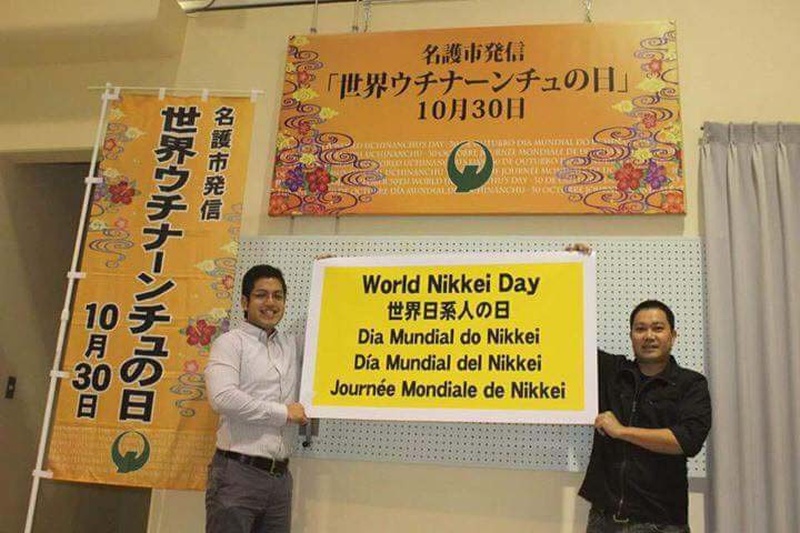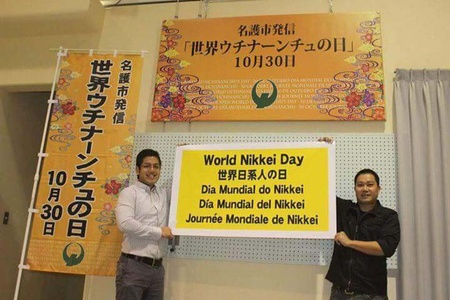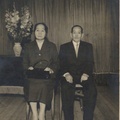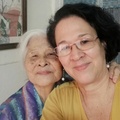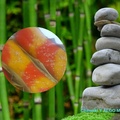A while back I saw in a Nikkei related facebook page that two young men, Andrés Higa from Argentina and Tadashi Andrés Ysa Urbina from Peru, had started a project. They lived in Okinawa and wanted to reclaim their roots, which for them meant Uchinanchu, and to be known and recognized in the world as such. The idea came about while they were studying and it turned into a major effort, as it wasn’t easy to achieve their first dream: creating Worldwide Uchinanchu Day on October 30.
We have only seen the end result of a long process, but along the way they have gained supporters, people who have joined their cause. Their effort has surprised and pleased all Uchinanchus, and again when they succeeded in bringing together Nikkeis from around the world. Two young men who could have spent their free time at leisure and having fun, but their sentiment and love for their roots led them from one place to another, knocking on many doors, and perhaps finding that many of them were closed.
It’s very gratifying to see that despite their age, they were willing to step out of their comfort zone, to help us feel that we are Uchinanchu and that there are many others like us around the world. But that wasn’t the end of the story. After that effort, they began another campaign to have June 20 declared International Nikkei Day to unify not only Okinawans, but everyone of Japanese origin. In Hawaii in early June, during an event organized by Kaigai Nikkeijin Kyoukai, June 20 was declared “International Nikkei Day.”
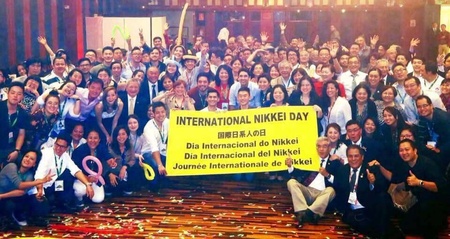
We often ask ourselves, “What is Nikkei?” The concept seems to be “the name for immigrants of Japanese origin and their descendants.” That may be the official definition but I believe, I feel, that it is something much greater than that. It encompasses a sentiment, shared values, many things in common such as customs and food, regardless of nationality. And we don’t necessarily have the same physical characteristics, because many of us are multiracial.
It means having, even if just a tiny thread, of our ancestors’ bloodline. It’s something we all have within us, it's our way of being, of behaving, the things that were passed down to our parents and then to us, and which we will pass down to our children. That no matter where we find ourselves, whether in a difficult or a comfortable situation, that way of being always comes out. Hard workers, honorable, perseverant, loyal.
To explain ourselves better, let’s recall the shared history of our grandparents, who came from a distant place, from Japan, in search of a better future for their families. They came to work, taking on any kind of labor. Most went first to the countryside where they toiled during long hours exposed to the heat and the cold, depending on the season. As my mother-in-law used to say, “We worked like peons for the rancher.” It was difficult, but they were good workers. Even when they were treated unfairly, they were always loyal.
They worked a great deal, without taking anything from anyone; they told the truth; they were just and honorable. Despite the many problems they faced (injustices, discrimination) they always got back up on their feet and persevered. They taught us to share, because that's what they always did with family, friends or acquaintances; regardless of race, economic or social status, because our obas taught us to welcome everyone into our homes. It didn’t matter if there was one more plate of food to serve, they always went to great lengths to make visitors feel at home. They adapted to each place where they settled, adopting the religion, integrating into society, even coming to love the land that welcomed them, or in our case, where we were born. They loved it as much as anyone else, but always retained our customs, remembered our roots, venerated our deceased relatives.
For me that is being Nikkei. Being able to adapt to any country, so that whenever you meet a Nikkei from any part of the world, they always seem a bit familiar, as if you already knew them. It’s as if they were family, with shared customs and similar experiences but different nationalities.
That’s why I believe this achievement is so important, to have an International Nikkei Day, recognizing the Japanese immigrants who ventured out into the world to start a family, who sacrified and suffered but showed us how to become people with values and to recognize all Nikkei throughout the world, to help each other, working together in our respective countries.
These young men don’t sit still; they're always searching for new ways to promote integration and exchange ideas with everyone. Eventually they met up with Lucas Coscarelli Metomura, an Argentine Nikkei who represents COPANI Argentina, in Okinawa. As they exchanged ideas, he suggested it would be a good idea to celebrate International Nikkei Day in each community. He also thought it would be excellent if the word “Nikkei” were included in the Dictionary of the Royal Spanish Academy. Such an achievement would be fantastic. We all deserve it, and I wouldn't be surprised if our friends are able to achieve that goal in the future. This newest Nikkei joining the effort is from Argentina, and his Okinawan grandparents are from Miagi-Jima Island, now part of Uruma-Shi.
HAPPY INTERNATIONAL NIKKEI DAY!
© 2018 Roberto Oshiro Teruya


